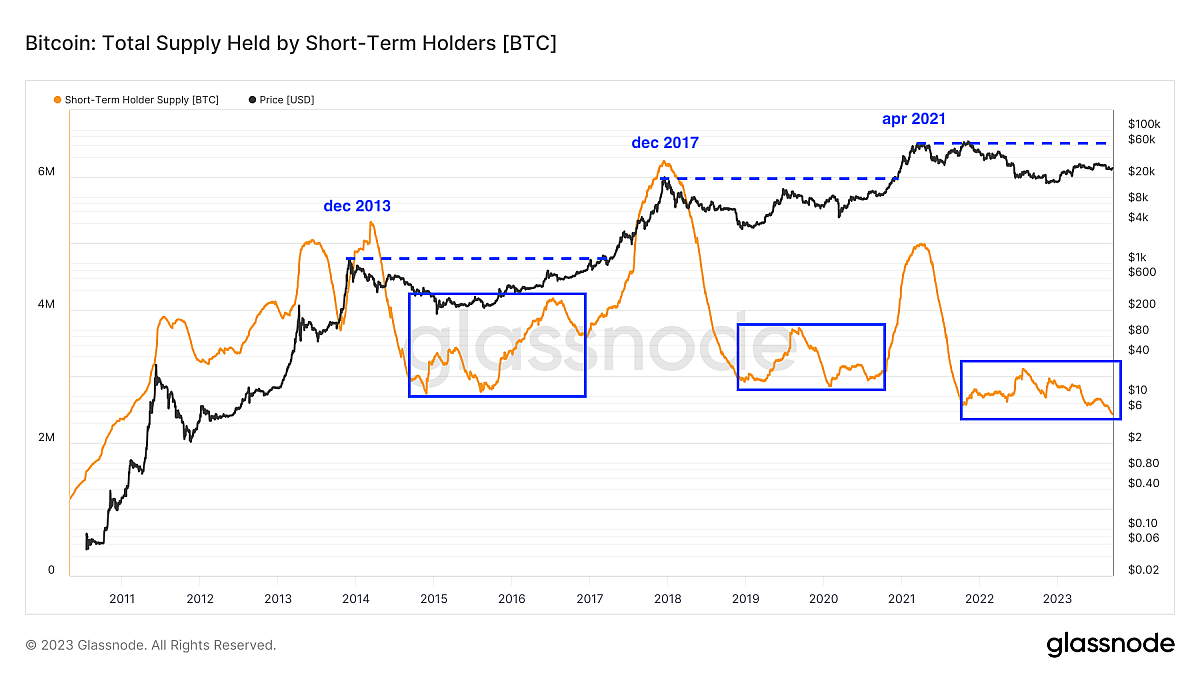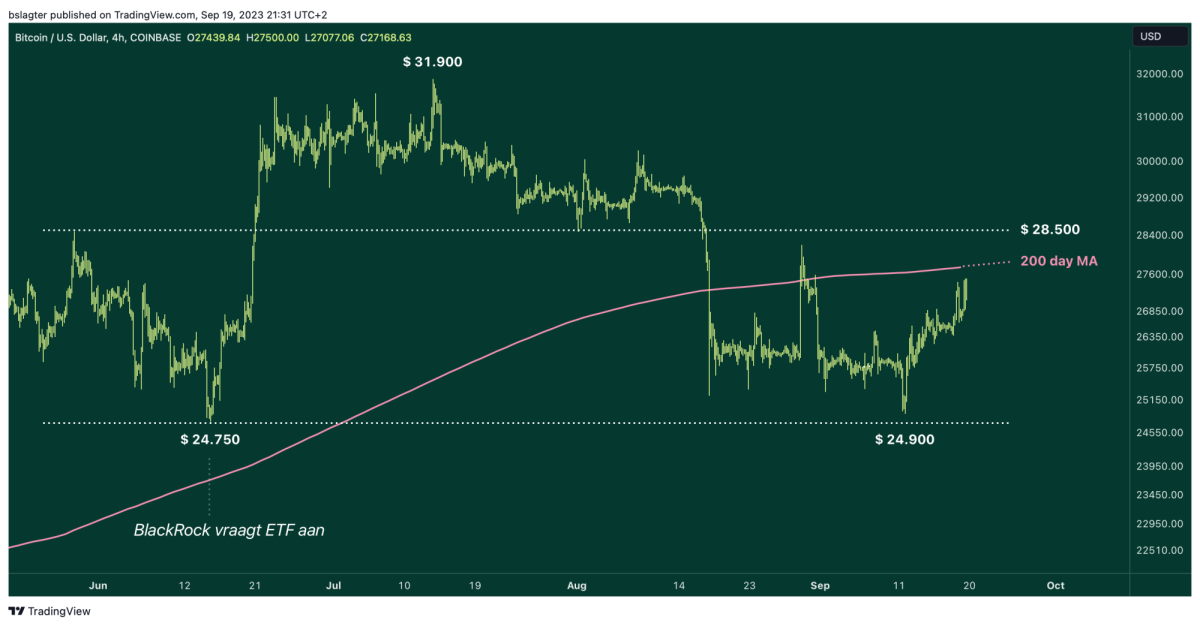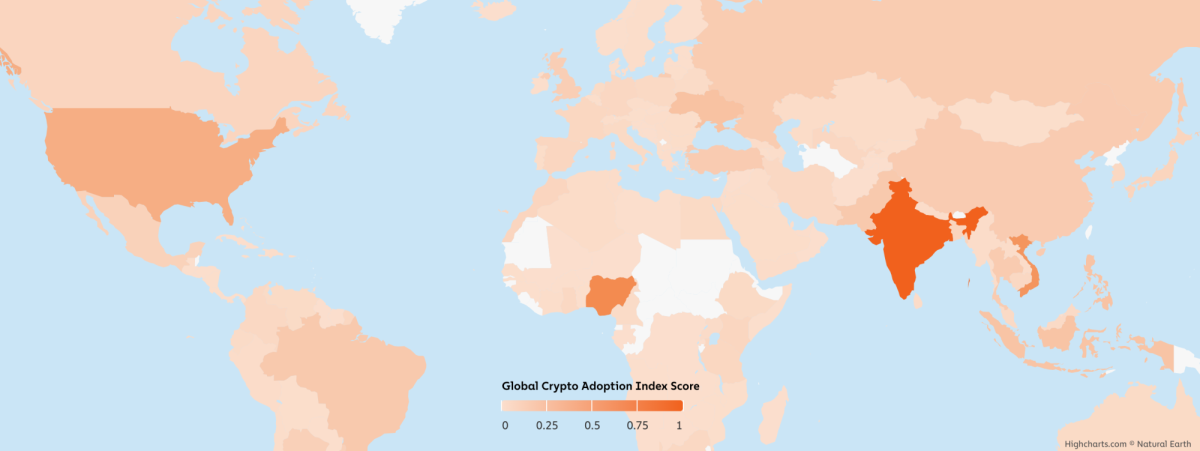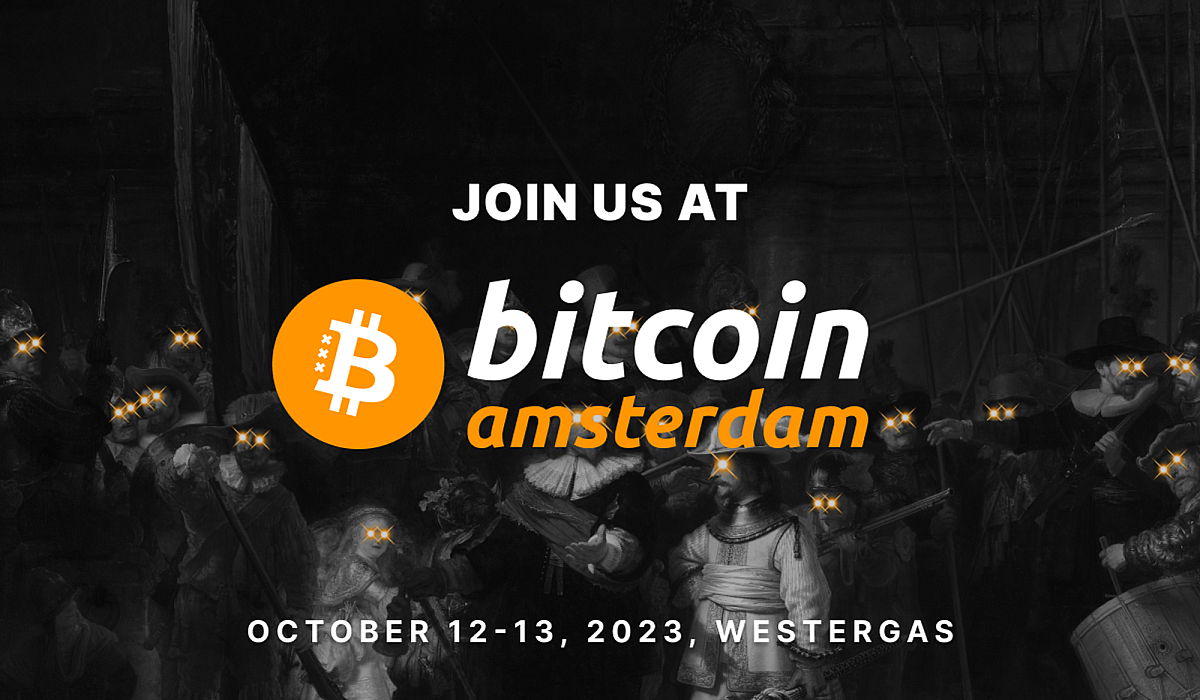Dutch have world's highest interest in crypto

21 September 2023
Annually, ForexSuggest quantifies a country's readiness for crypto asset adoption. On one of the angles, the Netherlands appears to be playing a leading role. How exactly? You can read that, and more, in this Weekly!
Cryptomarket
With on-chain analysis, we study all transactions recorded in the blockchain and try to understand from them how different groups of users behave.
To do this, analytics companies such as Glassnode, CryptoQuant, and Nansen look for addresses that belong together with high probability. We call such a cluster an entity. Of some entities, we know what kind of user it is, e.g. an exchange, custodian, fund, OTC desk, or miner. Of the rest, we do not know.
Yet we can say a lot about the rest. How much bitcoin they own, how long ago they started collecting bitcoin, how active they are, whether they mainly buy or also sell, whether they are at profit or loss, and so on.
A commonly used dichotomy is that of short-term holders (STH) and long-term holders (LTH). The dividing line between them is about five months. Research shows that after that time, the chances of this user selling his bitcoins anytime soon have become slim.
The LTH supply is the amount of bitcoin held by long-term holders. In the past, they tended to sell their bitcoin only in the latter part of the bull market, from the moment the price set new all-time highs again.
The buyers are largely new investors entering the market. From then on, the bitcoins will be part of the STH supply again. In fact, we do not know whether these new investors will actually hold on to their bitcoins for a long time, or sell them quickly at a little profit (or in a panic).
With this knowledge in mind, we can make two predictions.
First, if in the bear market the STH supply starts to rise quickly, that is a signal (but not a guarantee) that new investors are entering the market, and we are heading towards the end of the bear market.
Second, the lower the STH supply gets, the more sensitive the price becomes to increasing demand. After all, at that point, a larger share of bitcoins is held by experienced investors who only sell later.
Below is the graph of the STH supply. We have marked the bear markets with blue boxes. Currently, 2.4 million bitcoin is held by short term holders, the smallest amount since 2011.
On the far right side, we see no rapid rise yet. This also fits with other signals we see, namely that there is still little inflow of new capital. The low and falling level of the STH supply is remarkable. It shows high confidence among experienced investors, the long-term holders. It could provide the fuel for a period of rapid rise once inflows from new investors take off.

The chart above covers 12 years. From that wide view, let's go back to the past few months.
All summer, the price has been between $24,750 and $31,900. In recent weeks, we have been at the lower end of this relatively narrow price range. Early last week, the price dropped to $24,900 in a short period.
This kept the price of bitcoin just above the bottom of 15 June, when BlackRock filed its ETF application. Since then, the price has risen quite a bit. But there is no great optimism yet. For that, we want to see bitcoin trading above the 200-day average and horizontal resistance for an extended period. That dividing line is now at $28,500.
Tonight, the US central bank will announce whether it will raise interest rates again. Chairman Jerome Powell's words may cause some turmoil in financial markets. Whether it can finally push bitcoin beyond this now somewhat boring price range? We are curious.

News summary
Many people in Western Europe know bitcoin and other crypto assets mainly from the perspective of investing or speculating. And that is fine. For the development of a decentralised financial system, mature marketplaces are indispensable.
But as a result, we quickly lose sight of the essence of this new technology, namely that everyone in the world can pay, save and trade without depending on a central authority that can censor and exclude.
In Europe, none of this seems so necessary. We have a stable currency, a reliable government and a payment system accessible to all. The move to "crypto is pure speculation" is then quickly made.
That this conclusion is too facile, Alex Gladstein showed two years ago with his book Check Your Financial Privilege. The chief strategist of the Human Rights Foundation describes how in numerous countries the existence of bitcoin is life-saving. For victims of corrupt governments and collapsing money systems, crypto is revolutionary.
But between the refugees and oppressed on one side, and the investors and speculators on the other, there is a large group of people who have simply started using crypto daily.
Last week, analytics firm Chainalysis published its annual Crypto Adoption Index, a ranking of countries where the average citizen embraces crypto the most. To do so, they weight crypto use and possession by population size and income, so that large, rich countries do not distort the picture.
The top five countries are India, Nigeria, Vietnam, United States and Ukraine. The top 20 does not include any European Union country. The United Kingdom comes closest with spot 14.
In short, emerging economies are driving global crypto adoption.

So is there no role at all for a privileged country like the Netherlands? To answer that question, let's take a look at another report, that of ForexSuggest. Every year, the company quantifies a country's readiness to adopt the new technology. It looks at ATMs, businesses, accessibility, and legality. The top three this year are Hong Kong, Switzerland, and the US.
Of the Dutch, it is notable that they search for crypto assets or related terms relatively often. With 2524 searches per 100,000 inhabitants, we grab gold in this category. Based on this measurement, we can say that no other country hosts as many interested people as ours.
Fat chance that investing and speculation is the main driver of that. But that too is a form of adoption, and not an unimportant one. Indeed, we play an important role in this. The power that flows into the ecosystem through us provides much-needed stability and availability for everyday cryptocurrency users.
Other news:
Deutsche Bank is going to manage bitcoin for institutional clients. Germany's largest bank is teaming up with Swiss company Taurus for this purpose, Reuters writes. For now, it only involves the storage of bitcoin and other cryptocurrencies. According to Reuters, the bank has been planning to offer such services since 2020. Trading options are not part of the current plans.
Asset manager Franklin also wants a spot bitcoin ETF. Franklin Templeton Investments manages more than $1.5 trillion for its clients. A total of 10 major financial institutions are now in the running for an ETF. Together, these have more than $17.5 trillion under management. Whether and when approval will come is still unknown. During a recent US Congressional hearing, SEC chairman Gary Gensler did not let on much about it.
Japan's largest investment bank Nomura launches bitcoin fund. The new fund is in the name of the subsidiary Laser Digital and offers only direct exposure to bitcoin's performance. In a press release, the company says more financial products around crypto assets are on the cards. Nomura has more than $400 billion in total assets under management.
Deepen
In the podcast 'Toegevoegde Waarde', FD journalist Anna Dijkman goes in search of the stories behind the economy. In the first episode, she dives into the phenomenon of inflation and the world of monetary policy. How does (hyper)inflation arise? What happens when deflation occurs? And where does this pursuit of 2% inflation come from anyway? Small spoiler: it has something to do with a New Zealand kiwi grower.
Behind the scenes
Will we see you at Bitcoin Amsterdam?
On 12 and 13 October, we will be present at Bitcoin Amsterdam, Europe's largest bitcoin conference! We would love to welcome you to our booth to discuss the current state of bitcoin and the latest developments within Amdax.
Don't have tickets yet? As a partner of Bitcoin Amsterdam, we may offer 50 tickets at 50% discount. Available while stocks last, so be quick. We expect another two educational and fun days!


Our website uses cookies
We use cookies to personalize content and advertisements, to offer social media features and to analyze our website’s traffic. We’ll also share information about your usage with our partners for social media, advertising and analysis. These partners can combine this data with data you’ve already provided to them, or that they’ve collected based on your use of their services.